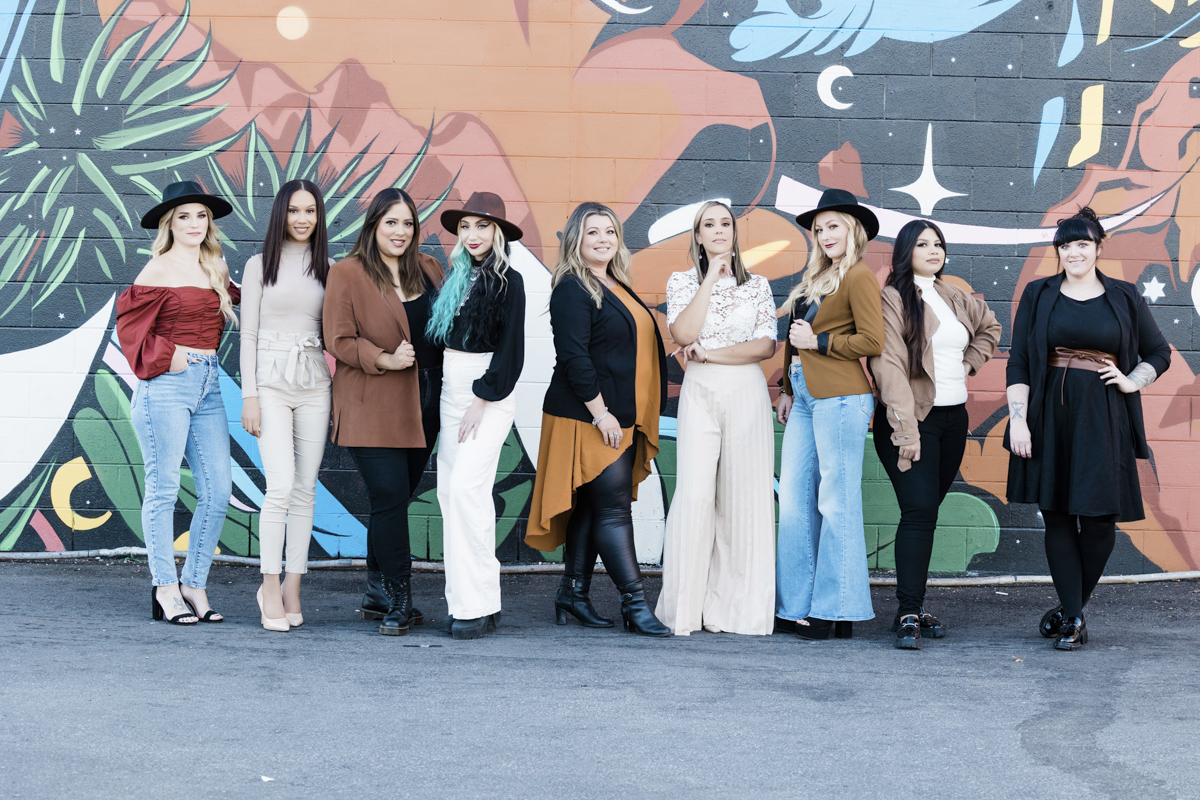16 Steps to Sharpen Your Marketing’s Effectiveness by Focusing on Your Multi-channel Consistency
The importance of having and maintaining a collection of proper brand assets to use promoting your photography business as a part of your overall marketing strategy cannot be overstated.
Whether you want to position your photography business to be as innovative as the all-time great photographer Ansel Adams or as by-the-book as a police officer in charge of taking mugshots, you still need to be businesslike with your branding. At the end of the day you want (no, you NEED!) to be seen as a professional photographer and a small business owner who has their act together.
Your customers may not know the difference between the rule of thirds and the depth of field, but if you can show them a compelling set of seamless brand assets across your marketing pieces, then you’ll capture more leads, book more photo sessions and make more money.
Whether you’re in the early stages of creating your photography based brand or have had one for a while that could maybe use a refresh, it’s always a good time to work through the checklist. Getting off to a good start is as important as a good restart. You may even find it helpful to do on a regular basis. No matter what, defining your photography brand is an important step on the journey to success.

Why Might You Need a Checklist?
For each statement below, answer “Yes” or “No.” If the answer is even one “Yes,” then it’s a good time to revisit the brand checklist.
Inconsistent Branding
Is your brand’s image fragmented due to inconsistent use of logos, colors, messaging or other elements?
Customer Confusion
Do your customers struggle to understand what your business stands for, its values or even what it sells?
Market Competition
Has increased competition made it harder for you to capture the attention of your ideal prospects, prompting the need for differentiation?
Business Growth
Are you trying to attract larger clients or bigger bookings as part of your growth strategy?
Launch of New Products/Services
Are you planning to launch a new product or service but haven’t considered how it will integrate with your existing brand?
Digital Presence
Has a push to enhance your online presence revealed gaps in your branding strategy?
Rebranding Effort
Is your business undergoing a rebranding effort, requiring systematic updates to all brand elements?
Employee Onboarding
Do new employees lack a clear understanding of your brand, leading to inconsistencies in customer interactions and marketing efforts?
How Often Should You Revisit Your Brand Checklist?
Certainly you want to work through the branding checklist when you first create your company.
Going forward you should do it about once a year as it coincides with a business need.
If ever it feels like something is dragging your marketing efforts down, it’s time to circle back to the checklist and see if you can pinpoint what’s causing it.
The solution might be as simple as a fresh set of brand photos that can better tell your brand story.

Maybe the recent service you added isn’t coming off quite right and a little more industry research could turn it around.
If you notice a drop-off in new business that’s more than just a seasonal dip, give the checklist another chance to work its magic.
Some fresh messaging can draw some attention and jump-start your sales department.
You can do a complete overhaul or you can give it a once over and make small course adjustments.
With a thoughtful brand identity you’ll get recognized and be remembered.

The Brand Checklist
I’ve placed these brand standards in more or less a chronological order. Start at the top and work your way down; decisions you make in one step will inform the next. You can work on a handful of them at a time and by the time you get to the bottom you’ll be way in front of a majority of business owners.
Brand Mission Statement
Writing your brand’s mission statement gives your company a reason to exist and states what its purpose is. Anyone who reads it will know what your brand is all about. There’s a good reason answering the “why” is job number one.
Vision Statement
This is an aspirational statement. It’s the place to put your long term goal in writing. With your vision statement, you’ll be going boldly where no brand has gone before.
Values
Stating what’s important to your brand attracts like-minded individuals. This goes for employees and customers. Defining your values and sticking to them will give you loyal followers.
Industry Research
Now’s the time to do a deep dive. The industry already has best practices and standard procedures in place, so you’ll want to study the field and figure out where you fit in. Discover where to follow the leaders and where to break the mold to differentiate yourself.
Core Offering
Figure out what you’ll provide to your customers and what they’ll get out of it. When what you’re offering matches a need, you’ve nailed it.
Competitors
When your offering matches a need better than the competition’s, you’re on your way to the moon. Figure out what you’re up against, where you fit in and how you can beat them. As a bonus, you’ll see their branding and can use it for inspiration when completing the creative parts of the brand checklist.
Target Audience
Knowing who your customers are is as important as pinpointing your product. Use your imagination to create a detailed profile of your ideal customers. Who are they? Where are they from? What do they do on weekends? What makes them tick? Come up with a handful of fictional characters that are representations of your target audience. Knowing who they are will help you market to them in real life.

Brand Mood Board
Now come the really creative bits. Put together a collection of ideas, pictures, color swatches and other things that embody your brand. Answer this question: What is the vibe? What does it look like and feel like? If you’re artistically challenged, try ripping pages from magazines, printing images off your computer or make photo copies from books. Bring it all to the table and then start piecing together the puzzle in your mind. This will most likely stay as an internal document, but like the next step, it’s where you start to flesh out the skeleton you’ve built up until now.
Brand Voice
What sort of language will your brand have? Is it calm and soothing or is it aggressive and bold? Pick out the words you will use. Are they youthful, classic, luxury or spicy words? Shoot to develop a bank of words and concepts you will always be able to pull from that defines your brand through thick and thin.
Brand Messaging
You’ll need a set of core messages that will be repeated throughout the brand’s life. Repetition breeds familiarity, which is what you’re after. Tell people about your brand in a way that resonates with them and meets their needs, wants and beliefs.
Brand Story
This will weave together the history of your brand. Tell the narrative of who built it, how they built it and why they built it. This includes how the brand’s history drives the brand’s present and future.

Color Palette
When picking the brand colors, consider the emotions those colors evoke. Colors go a long way to giving your brand a personality. Make sure it matches the brand voice, the story and is true to your mood board.
Fonts
Don’t let fonts become an afterthought. This design element can be a secret weapon. Pick a good one and it will look like it was meant to be; pick a bad one and you’ll be hating it for the rest of the brand’s life. The font should reflect the brand’s personality. Make it count.
Logo
And we’ve finally arrived at the logo. The first thing that people think of comes at the end of the brand checklist. Because if it’s what customers see and think of first when encountering your brand, then you want it to be the most informed piece of your branding arsenal.
Lay the groundwork and then dazzle them with a professionally designed logo. A good graphic designer will need to have the MVV, the story, the voice and all the other pieces to do their job well for you, so don’t skip any of the prior steps. Do it right and you’ll be rewarded.
Brand Photos
Single-owner businesses, small businesses, medium businesses and everyone in between will benefit from a gallery of useful brand photography because it increases your conversion rate.
A picture tells a thousand words, and when the images you use to tell your story are unique to your company, you’re able to tell a story that no one else can: YOURS! More and more these days, consumers want to connect with businesses and companies that they can relate to. There’s no better way to do this than with brand photography created specifically for your business.
Introducing yourself to people via brand photos, taken by a professional photographer who understands the powerful ways to use them, is a sure fire way to supercharge your brand and your marketing efforts.
Get The Brand That Makes Them Say “YES”
I start each day fired up to help small businesses tell their stories through timeless photography that bucks the trends and stays true to the moment.
With years of experience and a passion for storytelling, my team and I specialize in capturing the essence of your unique brand through trustworthy and marketable imagery. Get in touch so that we can start creating a reflection of you that you’ll be proud to share with the world.
Plan and schedule a shoot and you’ll soon have a complete set of personal brand photographs along with a personalized plan for how to successfully use it.
"*" indicates required fields